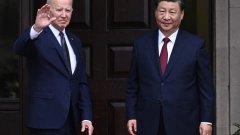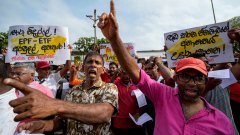
China's leaders vowed to boost domestic demand, prioritize the development of strategic sectors and tackle the country's real estate crisis, following a key meeting that laid out economic priorities for the new year.
Under a new slogan pledging to achieve stability through economic progress, Chinese leaders said it's necessary to overcome some difficulties and challenges, which include insufficient demand, overcapacity in some industries, weak social expectations and many hidden risks which still exist, according to .
"China's economy has achieved a recovery, with solid progress made in high-quality development in 2023," Chinese leaders said, according to a of the two-day meeting published by state-owned Xinhua. "China still has to overcome some difficulties and challenges to further revive the economy."
In a CCTV readout of the meeting, China's leaders stressed that a focus on high quality development is key, prescribing a nine-point plan that included technological innovation in the industrial system, boosting domestic consumption, expanding high-level foreign investment and revitalizing agriculture to boost food security.
This year's Central Economic Work Conference comes as the post-Covid-19 recovery of the world's second-largest economy has so far fallen short of expectations. A litany of policy support measures have not sufficiently lifted economic sentiment, igniting calls for Beijing to amp up its stimulus amid renewed fears of a deepening slowdown.
It's not helped by the most recent raft of economic data, which has pointed to persistently weak domestic demand.
China's consumer prices at their fastest rate in three years, while producer price deflation extended into a 14th month. , missing Reuters' forecast for a 3.3% increase from a year ago.
Some of the largest real estate developers are facing serious debt problems as part of Beijing's broader — which accounts directly and indirectly for about one third of China's economic activities.
China's leaders pledged to diffuse risks linked to local debt and small and medium financial institutions. They also signaled a strategy to build affordable housing in an attempt to resolve the nation's spiraling real estate crisis, which has been festering since President Xi Jinping kicked off a crackdown on the sector in late 2020.
The readout also addressed major economic issues ranging from the country's declining fertility rates to high rates of unemployment, particularly among the younger population, and the resilience and safety of the domestic supply chains.
China's leaders additionally reiterated they would support the development of private enterprises and foster innovation in science and technology, green transformation and the digital economy, including artificial intelligence.
The Beijing leaders pledged to strengthen macro policies, while continuing to implement proactive fiscal policies and prudent monetary action.
The language employed in the Tuesday readout is similar to the one used by the Politburo — the top decision-making body of the ruling Chinese Communist Party — in a Friday release. At the time, the Politburo said that fiscal policy "must be moderately strengthened" and will be "flexible, moderate, precise, and effective" to stimulate economic recovery, according to state-run news outlet .
These moves follow a rare development in October, when Beijing announced a plan to issue 1 trillion yuan ($139 billion) in sovereign bonds by the end of the year, of gross domestic product, .
Last week, Moody's downgraded its ratings for and from stable to negative. The ratings agency expects China's fiscal, economic and institutional strength to suffer from possible bailouts for distressed local governments and state-owned companies.




